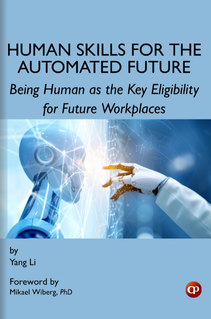The Balancing Role of Academic Leaders

by Yang Li
Academic Researcher & K-12 Consultant, Jiangsu-Nanjing 210023, China.
10.46679/9788196780586ch08
This chapter is a part of: Human Skills for the Automated Future: Being Human as the Key Eligibility for Future Workplaces by Yang Li
ISBN (Ebook):978-81-967805-8-6
ISBN (Softcover Print):978-93-49926-23-3
© CSMFL Publications & its authors.
Published: May 15, 2025
Abstract
Balance—balance of AI adoption and human skills is the key to future workplaces’ success. To achieve this balance there will be the need to strike a balance between AI and human skills in the academic parlance. The students will need to be equipped with AI skills in addition to their generic human skills. They need to develop and hone up their human skill to such a level that AI don’t make them useless for future workplaces. And, for this they are the perfect candidates—being human. And having human skills will keep them relevant in AI working environments. This chapter discusses this balance and how academic leaders, teachers, and students can achieve this balance.
Keywords: Balancing AI and human skills, academic leadership, future of education
References
- Kumar, S. (2023). Developing Human Skills in the Era of Artificial Intelligence: Challenges and Opportunities for Education and Training. Scholedge International Journal of Multidisciplinary & Allied Studies, 10(2), 11–19. https://doi.org/10.19085/sijmas100201
- Mahmud, B. U., Hong, G. Y., & Fong, B. (2023). A Study of Human-AI Symbiosis for Creative Work: Recent Developments and Future Directions in Deep Learning. ACM Transactions on Multimedia Computing, Communications, and Applications, 20(2). https://doi.org/10.1145/3542698
- Oberer, B., & Erkollar, A. (2023). Harmonizing Horizons: The Symphony of Human-Machine Collaboration in the Age of AI. Journal of Systemics Cybernetics and Informatics, 21(4), 82–86. https://doi.org/10.54808/jsci.21.04.82
- Schleiger, E., Mason, C., Naughtin, C., Reeson, A., & Paris, C. (2023). Collaborative Intelligence: A scoping review of current applications. Qeios. https://doi.org/10.32388/RZGEPB
- Sfetcu, N. (2024). The Influence of Artificial Intelligence on Human Activity and Human Intelligence. Intelligence Info, 3(3). https://doi.org/10.58679/ii47046
- Westover, J. (2024). How AI Use Will Increase the Value of Soft Skills at Work. Human Capital Leadership Review, 13(4). https://doi.org/10.70175/hclreview.2020.13.4.5
This book is available worldwide via EBSCOhost Academic Collection, EBSCO E- books, Google Play Books, Amazon, World Cat Discovery Service/OCLC, CSMFL Bookstore, and 200+ book resellers and academic content vendors.
Statement on Publication Ethics
We, at CSMFL Publications, are committed to ensure the unbiased and transparent publishing, and upholding the high standards of editorial integrity in our publications. To know more, please read our Statement on Publication Ethics, Editorial Integrity & Misconduct